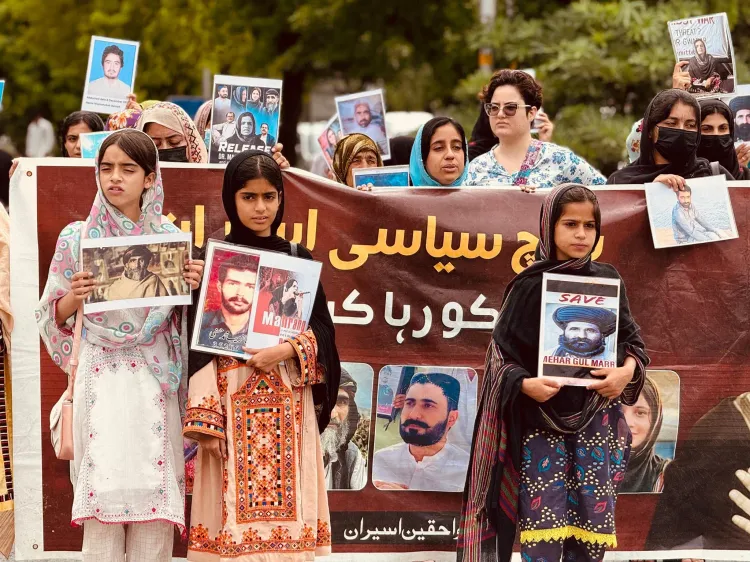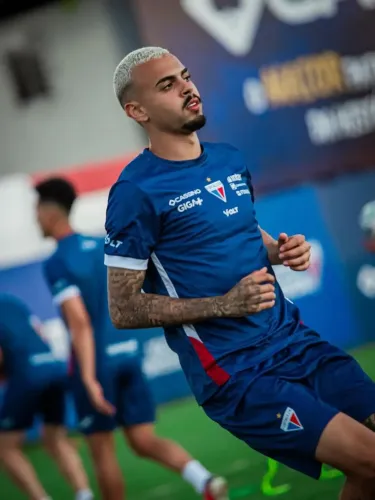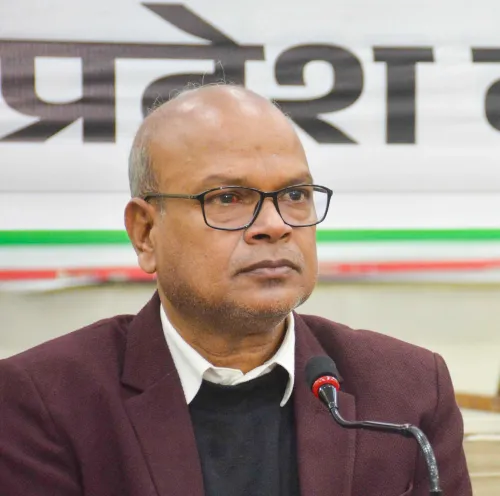Why is the Baloch Yakjehti Committee Condemning Pakistani Authorities?

Synopsis
Key Takeaways
- The Baloch Yakjehti Committee is protesting against unlawful detentions and enforced disappearances.
- Pakistani authorities are using extreme measures to suppress these protests.
- Solidarity from the public and human rights defenders is crucial.
- The situation highlights significant human rights concerns in Pakistan.
- The protest underscores the ongoing struggle for justice by marginalized communities.
Islamabad, July 23 (NationPress) The Baloch Yakjehti Committee (BYC) has strongly criticized Pakistani authorities for obstructing access to the Islamabad Press Club, employing buses and barbed wire to confine Baloch families who are protesting the unlawful detention of BYC leaders and ongoing enforced disappearances, as their sit-in marks its eighth day. The BYC has urged individuals, media personnel, and human rights advocates to unite in support of these protesting families.
In a post shared on X, the BYC emphasized, "On the eighth consecutive day, Pakistani authorities persist in blocking all routes to the Islamabad Press Club using buses and barbed wire to isolate Baloch families protesting against the unlawful detention of Baloch Yakjehti Committee (BYC) leaders and enforced disappearances."
"These families, many comprising elderly women, mothers, and children, have journeyed from Balochistan in search of justice — not isolation. Yet, they are being trapped, hidden from public view, and denied their democratic right to protest. We demand an immediate end to these oppressive tactics and call upon all conscious citizens, journalists, and human rights defenders to stand with the protesting families," the statement continued.
On July 21, a human rights organization representing Baloch interests condemned the Pakistani authorities for forcibly removing Baloch protestors — including women, children, and elderly individuals — from their residence after cutting off their water supply and exposing them to harsh weather conditions in Islamabad.
"Islamabad authorities have forcibly evicted Baloch protestors from their home after terminating their water supply and subjecting them to rain and heat. Coercing landlords to displace peaceful demonstrators is both cruel and unacceptable," stated the Baloch Voice for Justice.
In the meantime, Nadia Baloch, sister of BYC Central Organizer Mahrang Baloch, criticized the Islamabad Police and state institutions, accusing them of treating Baloch women in a manner that is unimaginable even for immigrants in any part of the globe.
"The Islamabad police and state institutions are treating Baloch women in a manner that is not even meted out to immigrants anywhere in the world. For years, our people have faced enforced disappearances, only to have their mutilated bodies discarded in remote areas. The state continues to occupy Baloch resources, exert control over our land, impose artificial leadership on our politics, and imprison our genuine leaders—yet it remains unsatisfied. Now, we are seemingly denied even the right to exist in the capital of our own country, Islamabad," Nadia posted on X.
"Evicting Baloch children, mothers, and elders from their homes in the dead of night and leaving them on the streets exemplifies not only insensitivity but the most heinous form of state oppression, fascism, and racial discrimination. Islamabad police and state institutions must clarify: Are Baloch individuals equal citizens of this state or not? If we are denied the right to live, speak, or seek justice in Islamabad, we will have to reconsider what this state represents for us," the post concluded.
Nadia stressed that the Baloch community has consistently sought their rights through peaceful protests within the constitutional framework. However, if the State does not amend its approach, she warned, the Baloch mothers, sisters, and daughters will not remain silent.
"This country does not belong solely to the powerful elite; it belongs to us too. If we are not regarded as citizens of this nation, then we will communicate in a manner you understand. And this path will not be easy for you either," Nadia emphasized.










